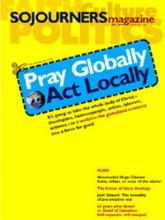The history of the struggles of the oppressed is the history of the call of the Holy Spirit to a divided world, writes Mexican theologian Maria Pilar Aquino in Our Cry for Life. For liberation theologians, the presence of the Holy Spirit is synonymous with the struggle for liberation. This observation is lived out in the experience of the early Christian community, as related in Acts. With the descent of the Holy Spirit, the community learns what it means to live the gospel "in a divided world." Filled with the Spirit, they are able to communicate with people from every culture and language, without fear or hesitation. They discover that enemies, strangers, and the unclean are also Gods children. In other words, they discover church.
With the help of the Spirit, the disciples spread the gospel far beyond what they imagined. They minister to and welcome Gentiles, amazed that "God has given even to the Gentiles the repentance that leads to life!" (Acts 11:18). The community had to be constantly reminded that Jesus resurrection meant new life for all of humanity; even physical death would never have the last word. The God of Jesus is faithful to the end. With this reassurance, we too can re-enter the world, newly converted and newly committed to the struggles for liberation in this divided, suffering world. Blessed by the Spirit, we too can engage the world as "Thou," making strangers into friends and enemies into neighbors, and encountering the presence of God in the process.
Michaela Bruzzese is a free-lance writer living in Chile.
Read the Full Article
